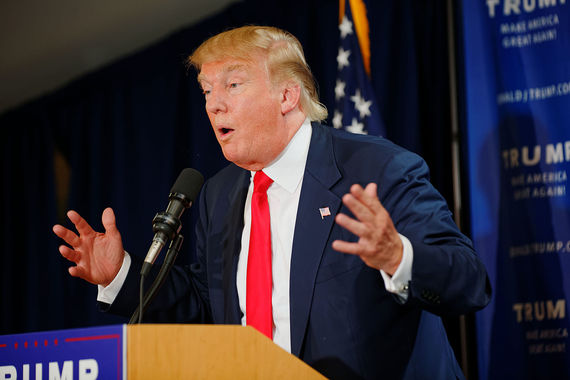In a relatively short period of time, real estate developer Donald Trump, a man with no prior political experience whatsoever, has risen to the number one spot in the Republican contest for the Presidential nomination.
How is this possible?
Were he just another billionaire (and it is a sign of the times that even that phrase is now possible), were he just another real estate developer (and Manhattan is full of them), it is inconceivable that such a phenomenon could take place. (Do you even have the vaguest idea of Seymour Durst's political opinions? He is the man who put the National Debt Clock - remember that? Still running - up in NYC).
What Trump has is a command of the most powerful medium we have.
Television.
He understands it. His years at The Apprentice have given him a deep appreciation for the unique way in which video impacts on us. It goest deep. (And we spend 5 hours a day, every day, watching it).
And he understands very well how to marry social media, Twitter in particular, to his television appearances.
New technologies of communication have always proven a quick pathway to political power for those few who 'got' it first. Adolf Hitler would probably have remained little more than another beer hall political ranting nutcase had it not been for the arrival of radio. Suddenly der Fuhrer was able to 'broadcast' his opinions to millions of Germans (with the added benefit that they did not get to see his non-Aryan face).
Hitler actually practiced his speeches for hours before a mirror, getting his cadences down just right for a radio audience. He would start with silence, which can be unnerving in radio, but it gets people to pay attention. He would then start slowly and build to a crescendo.
People listening at home on the radio were carried away by his performances as though on a great tide. He was the first radio superstar in Germany. Too bad his material was so terrible. But he knew how to use the new medium to woo and hold the crowd. It was as much about entertainment as it was about politics. In fact, it was the first (but hardly the last) mixing of the two.
On the other side of the Atlantic (and the English Channel), both Roosevelt and Churchill had a deep understanding of the immense power of this new medium of radio. Churchill, in fact often re-did his most powerful speeches in the House of Commons for a radio audience. Roosevelt, of course, united the country with his radio fireside chats.
JFK understood the new medium of television far better than Nixon, and went on to win both the nation's first televised debates and the Presidency, largely because he was far better television. Bill Clinton, playing the sax on Arsenio Hall, and talking about his underwear also understood television. Bob Dole, clearly, did not.
In the days of Kennedy and Clinton, television was a very limited medium. There were only a handful of networks. It was expensive to produce and to distribute.
The technological revolution of the past decade has changed all of that.
Today, anyone with an iPhone can produce 'television'. Anyone connected to the web can distribute it to a potential global audience of 3,5 billion people - for no cost.
Trump's power and influence come from the screen. It comes from his understanding of how television works; how it is able to hold and capture an audience. And, quite particular to our own age - an age inundated with television content - how he is able to punch through the noise with shocking statements. They get attention, and so does he.
He is the master of the new medium - video/social media.
No one talks about what Trump has written in the NY Times (or anywhere else. Even his much vaunted Art of the Deal was written by Tony Schwartz). His 'writings' are virtually non-existent. He is no Churchill.
Trump is not about text. He is about video images and imagery.
He is about putting his face on video, as often as he can.
There was at time when television was complicated. It was expensive. There were only a very few networks and they decided who got on the air and when. Those days are over.
Today, anyone with an iPhone can manufacture as much video as Trump. A lot more in fact. But so far, they don't. So far, the other candidates are very much still the products of a 1980's view of video and television. Specialized. Complex. Owned by networks.
The technology makes this different, even if they don't 'get it'.
Today, anyone can get access to it.
Any time they want.
And for no cost.
What Trump has... you have.
Us it. All of us.
Use it to express what you think is important.
Master the medium.
Once you do, you will see that it is not so terrifying nor so difficult.
But it is very very powerful and persuasive.

